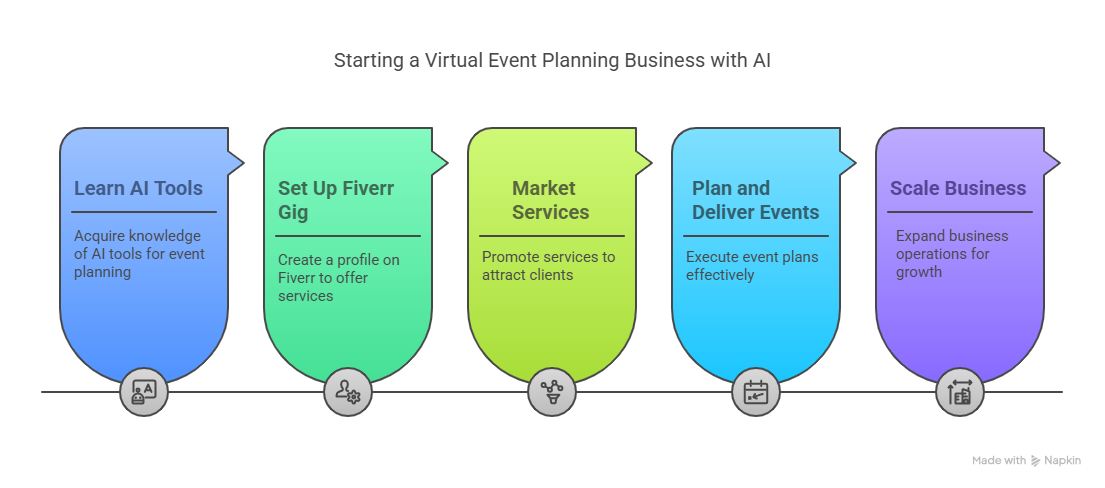In 2025, virtual events—ranging from corporate webinars to online weddings—are more popular than ever, and artificial intelligence (AI) is transforming how these events are planned. By leveraging AI tools, you can make money with AI tools for virtual events by offering efficient, personalized event planning services to businesses, individuals, and organizations. This guide explores how to start a profitable virtual event planning business using AI, with detailed platforms, a step-by-step procedure, marketing strategies, and practical tips to ensure success. Whether you’re a beginner or an experienced planner, this niche offers a lucrative opportunity to tap into a growing market. Let’s dive in!
Table of Contents
Why Virtual Event Planning to Make Money with AI Tools?
The global virtual events market is projected to grow at a CAGR of 11.2% from 2024 to 2030 (Grand View Research, 2024), driven by remote work, hybrid conferences, and the demand for seamless online experiences. AI tools streamline event planning by automating schedules, vendor coordination, and attendee engagement, making it an accessible and scalable way to make money with AI tools for virtual events. This niche combines creativity, technology, and client satisfaction, offering high earning potential with minimal startup costs. Here’s how to turn AI into your virtual event-planning superpower.
Benefits of Using AI for Virtual Event Planning
- Efficiency: AI generates timelines, budgets, and vendor lists in minutes.
- Personalization: Tailor events to client needs, from themes to attendee preferences.
- Cost-Effective: Reduce manual work, allowing you to serve more clients.
- Scalability: Handle multiple events simultaneously with AI automation.
- Client Appeal: Deliver professional, tech-savvy services that stand out.
Platforms to Make Money with AI Tools for Virtual Events
To launch your virtual event planning business, you’ll need AI tools for organization, communication, and promotion. Here are the top platforms with verified links:
- Airtable: A flexible tool to organize event timelines, budgets, and vendor details with AI-driven automation.
- Fiverr: A freelance marketplace to offers virtual event planning services to global clients.
- ChatGPT: An AI tool to generate event schedules, themes, and promotional content.
- Hopin: A virtual event platform for hosting webinars, conferences, or celebrations.
- Canva: A design tool with AI features to create event invitations, banners, and presentations.

Step-by-Step Procedure to Make Money with AI Tools for Virtual Events
Follow these actionable steps to start your virtual event planning business and begin earning in 2025:
Step 1: Learn AI Tools for Event Planning
- Sign up for Airtable and ChatGPT (free tiers available) to explore their features.
- Watch Airtable’s YouTube tutorials to learn how to create event planning templates (e.g., timelines, vendor trackers).
- Use ChatGPT to practice generating event schedules or theme ideas (e.g., “Create a 2-hour virtual corporate summit schedule”).
- Familiarize yourself with Hopin’s hosting features via its free demos or guides.
- Invest in premium plans if needed: Airtable ($20/month), ChatGPT Plus ($20/month).
Time Needed: 4–6 hours to master basics.
Step 2: Set Up Your Fiverr Gig
- Create a Fiverr account and set up a gig titled “AI-Powered Virtual Event Planning” ($100–$800 per event).
- Write a compelling description: “Plan your perfect virtual event—webinars, weddings, or team-building—with AI precision! I’ll deliver tailored schedules, vendor suggestions, and platform setup in 3–5 days.”
- Use Canva to design professional gig images, showcasing mock event schedules or virtual stages.
- Offer packages: Basic (scheduling, $100), Standard (scheduling + vendors, $300), Premium (full planning + hosting setup, $800).
- Set up Fiverr’s payment system or link PayPal for secure transactions.
Time Needed: 3–5 hours for gig setup.
Step 3: Market Your Services
- Promote your Fiverr gig on LinkedIn, targeting corporate clients, HR managers, or wedding planners with posts like: “Hosting a virtual conference? Let AI plan it flawlessly!”
- Share event planning tips on X, using hashtags like #VirtualEvents, #AIEventPlanning, or #MakeMoneyWithAITools.
- Join virtual event communities on Reddit (e.g., r/eventplanning) to offer advice and subtly link your services.
- Create a Canva-designed portfolio showcasing sample event schedules or client testimonials.
- Offer a 10% discount for first-time clients to build momentum.
Time Needed: Ongoing, 1–2 hours daily.
Step 4: Plan and Deliver Events
- Collect client details via Fiverr or Google Forms: event type (e.g., webinar, wedding), budget, audience size, and preferences.
- Use ChatGPT to generate a detailed event schedule, theme ideas, and vendor suggestions (e.g., “Suggest caterers for a virtual wedding after-party”).
- Organize details in Airtable, creating a shareable dashboard with timelines, tasks, and links to platforms like Hopin or Zoom.
- Design invitations or promotional graphics in Canva and share with clients for approval.
- Provide a setup guide for Hopin or Zoom, including tips for attendee engagement (e.g., polls, breakout rooms).
- Deliver the plan as a PDF and Airtable link within 3–5 days, offering one free revision.
Time Needed: 2–5 hours per event, depending on complexity.
Step 5: Scale Your Business
- Offer add-on services like live event moderation or post-event surveys for extra revenue.
- Create reusable Airtable templates for common events (e.g., webinars, team-building) to save time.
- Build a website on Wix or Squarespace to showcase your services and attract direct clients.
- Hire a virtual assistant via Upwork to handle client communication for 20+ events monthly.
- Expand to in-person hybrid events as a premium offering, using AI for logistics.
Time Needed: Varies based on scale.
Potential Earnings and Time Commitment
- Pricing: Charge $100–$300 for basic planning (scheduling, themes), $300–$800 for full planning (vendors, platform setup).
- Monthly Events: Start with 5–10 events (beginner) and scale to 20–30 (experienced).
- Earnings:
- Beginner: $500–$2,000/month (5–10 basic events at $100–$200).
- Intermediate: $3,000–$8,000/month (10–20 mixed events).
- Advanced: $10,000–$20,000/month (20–30 events with premium packages).
- Time Commitment: 10–15 hours/week for 5–10 events, scaling to 30–50 hours for 20+ events.
Tips to Succeed and Make Money with AI Tools for Virtual Events
- Check my complete guide for more practical ways to earn.
- Master Client Communication: Respond promptly and clarify expectations to build trust.
- Specialize in Niches: Focus on corporate webinars, virtual team-building, or online weddings for higher rates.
- Use AI for Insights: Analyze X posts for trending event themes (e.g., sustainability-focused conferences).
- Optimize Deliverables: Create visually appealing Airtable dashboards and Canva graphics to impress clients.
- Stay Tech-Savvy: Learn new platforms like Hopin or Remo to offer cutting-edge solutions.
- Ensure Accuracy: Double-check AI-generated schedules and vendor lists for reliability.
Challenges and How to Overcome Them
- Challenge: Saturated freelance market on Fiverr.
Solution: Differentiate with AI-driven efficiency and niche expertise (e.g., tech conferences). - Challenge: Clients have vague requirements.
Solution: Use a detailed Google Form to collect specifics upfront. - Challenge: Technical issues during events.
Solution: Provide backup platform options (e.g., Zoom and Microsoft Teams) in your setup guide. - Challenge: Slow initial bookings.
Solution: Run targeted LinkedIn ads ($20–$50 budget) to reach event organizers.
Real-World Example
In 2024, a US-based freelancer, “VirtualVibeEvents,” started offering AI-powered virtual event planning on Fiverr. By using Airtable and ChatGPT to plan webinars for small businesses, they grew to 15 events monthly within six months, earning $4,500/month. They added premium packages with Hopin setup, reaching $8,000/month by early 2025. Their success stemmed from LinkedIn networking, fast delivery (3 days), and a polished Canva portfolio.
See how you will earn and not just only make money with AI tools for virtual events. Also, learn more new ways to earn.
Launch Your Virtual Event Planning Business Now!
Virtual event planning is a dynamic, profitable way to make money with AI tools for virtual events in 2025. With Airtable, ChatGPT, and Fiverr, you can start serving clients in days and scale to a thriving business. Sign up for Airtable, create your Fiverr gig, and promote your services today. Share your journey in the comments or connect with me on LinkedIn for more AI-driven business tips. Ready to plan unforgettable virtual events? Your AI-powered success awaits!


1 thought on “How to Make Money with AI Tools by Offering Virtual Event Planning in 2025”